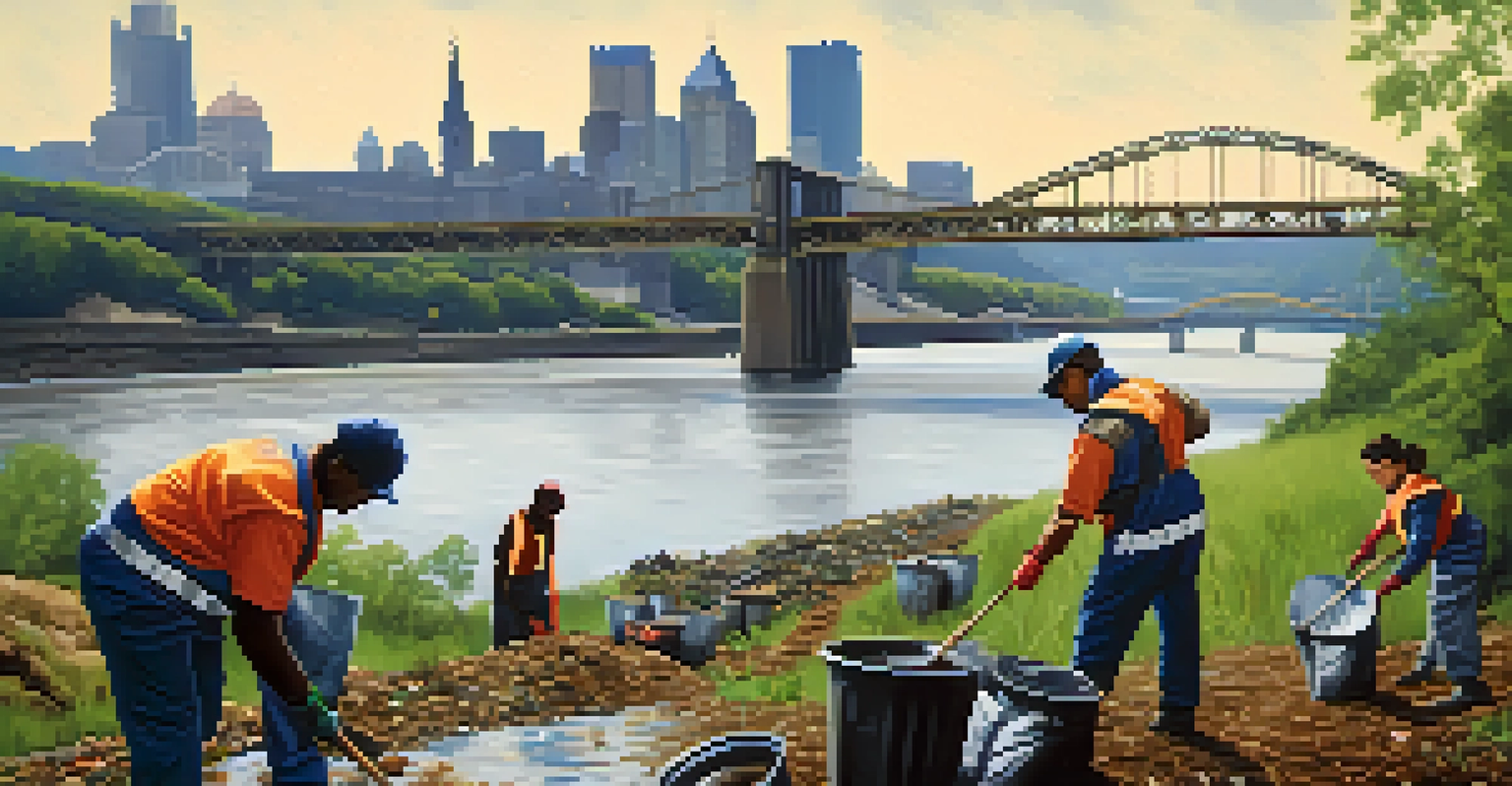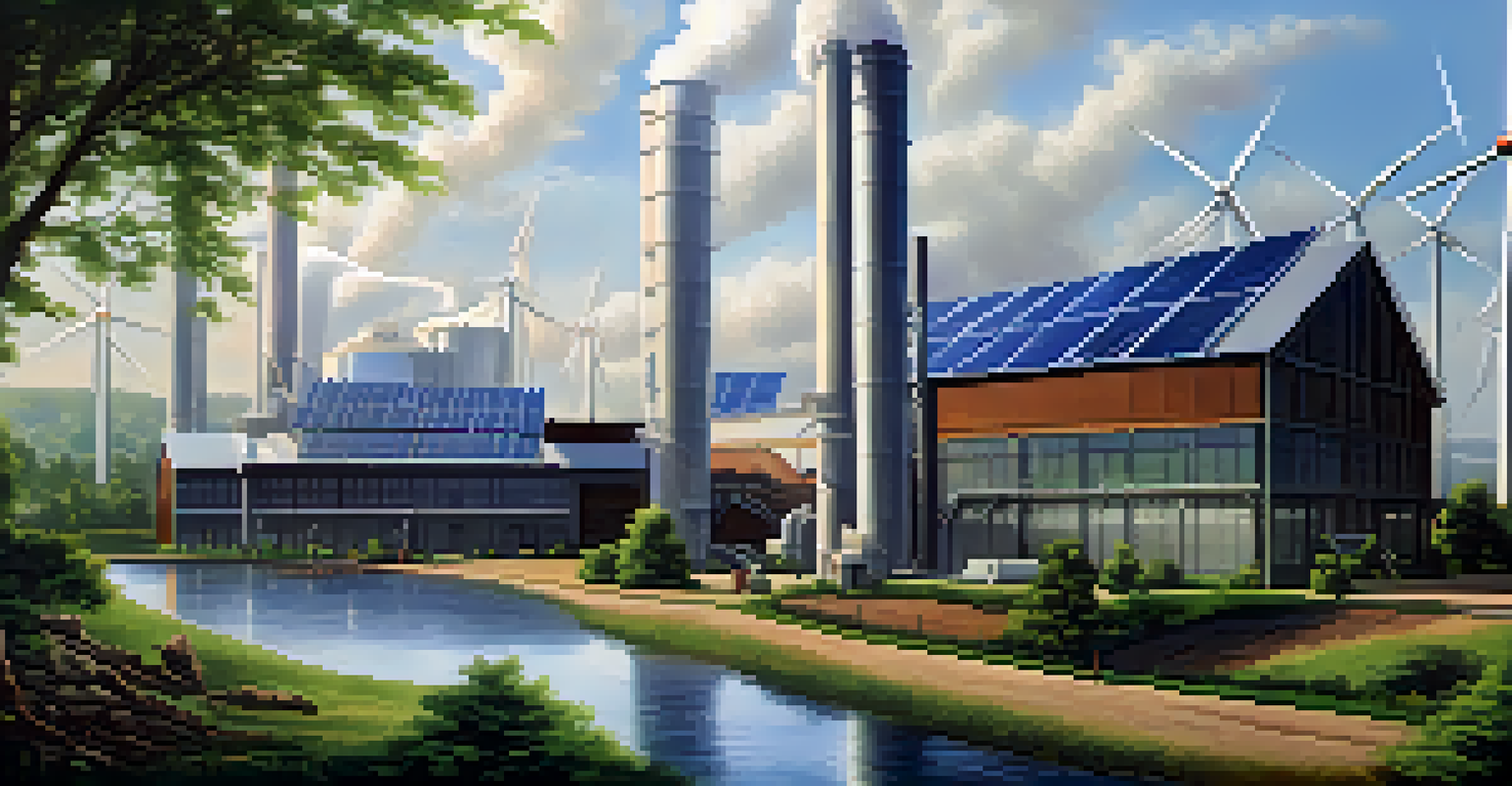Environmental Impact: The Steel Industry's Footprint in Pittsburgh

The Steel Industry's Historical Significance in Pittsburgh
Pittsburgh has long been known as the Steel City, a title reflecting its rich industrial history. The steel industry fueled the local economy, creating jobs and driving development for over a century. However, this growth came with environmental costs that are still felt today, shaping the landscape and community of Pittsburgh.
The environment is where we all meet; where we all have a mutual interest; it is the one thing all of us share.
During the peak of steel production, massive factories lined the rivers, and smoke billowed from stacks, contributing to air and water pollution. The industry’s expansion was a double-edged sword, bringing prosperity but also environmental degradation. This historical context is crucial for understanding the ongoing challenges the region faces.
As we look back at this industrial legacy, it becomes clear that the decisions made in the past continue to influence Pittsburgh’s environmental policies and community health today. The struggle to balance economic growth with environmental sustainability remains a pressing issue for the city.
Air Quality Challenges Linked to Steel Production
One of the most significant environmental impacts of the steel industry is air pollution. Emissions from steel mills release particulate matter and harmful gases, leading to respiratory issues among residents. Pittsburgh has worked hard to improve air quality, yet the legacy of steel production still lingers.

The city has seen improvements in air quality over the years, thanks in part to stricter regulations and the closure of many older mills. However, the transition hasn't been easy, as businesses and communities grapple with the remnants of a once-thriving industry. The battle against air pollution remains ongoing, emphasizing the need for sustainable practices.
Pittsburgh's Steel Legacy and Pollution
The steel industry's historical growth in Pittsburgh significantly contributed to air and water pollution, impacting community health and the environment.
Residents continue to advocate for cleaner air, highlighting the importance of community involvement in environmental issues. Efforts to monitor and reduce emissions are crucial to ensuring a healthier future for Pittsburgh's inhabitants, especially for vulnerable populations.
Water Pollution: A Legacy of Steel Manufacturing
The rivers of Pittsburgh, vital for both industry and recreation, have suffered greatly due to steel production. Wastewater and runoff from steel mills have historically contaminated local waterways, impacting aquatic life and drinking water quality. This pollution has long-lasting effects on the ecosystem and public health.
We won't have a society if we destroy the environment.
Efforts to clean up the rivers have been ongoing, with initiatives aimed at reducing industrial waste and restoring natural habitats. Organizations and government agencies are working together to monitor water quality and promote sustainable practices within the steel industry. However, challenges remain, particularly with aging infrastructure.
The journey toward cleaner waterways requires collaboration between industry leaders, environmentalists, and community members. By prioritizing water quality and ecosystem health, Pittsburgh can work towards a more sustainable future that honors its industrial past while protecting its natural resources.
The Role of Sustainable Practices in Steel Production
As awareness of environmental issues grows, the steel industry is evolving to adopt more sustainable practices. Innovations in technology and production methods aim to reduce waste and lower emissions, making steel manufacturing more eco-friendly. Companies are increasingly investing in cleaner technologies to minimize their environmental footprint.
Recycling steel is one of the most effective ways to decrease environmental impact. By reusing materials, the industry can reduce energy consumption and greenhouse gas emissions significantly. This approach not only benefits the environment but also supports the local economy by creating jobs in recycling and manufacturing.
Shift Towards Sustainable Practices
The steel industry in Pittsburgh is evolving by adopting sustainable practices and technologies to reduce waste and emissions.
Sustainable practices are becoming essential for the steel industry’s future. By prioritizing eco-friendly approaches, Pittsburgh can lead the way in demonstrating how industry and sustainability can coexist, ultimately transforming its environmental landscape.
Community Efforts in Environmental Restoration
Pittsburgh's residents are actively engaged in restoring their environment, showcasing community resilience and dedication. Grassroots organizations and local initiatives focus on cleaning up polluted areas, replanting trees, and promoting environmental education. These efforts are vital for healing the community and fostering a sense of stewardship.
Community involvement is crucial for raising awareness about environmental issues and advocating for policy changes. Residents often participate in local clean-up events and workshops to educate themselves and others about sustainability practices. This collective effort strengthens the bond between people and their environment.
Through collaboration and determination, the community can drive positive change in Pittsburgh’s environmental landscape. Their commitment to restoration not only benefits the environment but also enhances the quality of life for all residents.
Policy Changes and Their Impact on the Environment
Policies play a significant role in shaping the steel industry's environmental practices in Pittsburgh. Stricter regulations regarding emissions and waste disposal have prompted companies to adopt more sustainable operations. Policymakers are increasingly recognizing the importance of a balanced approach to industry and environmental protection.
Local governments and environmental agencies are working together to create guidelines that promote sustainable practices while supporting economic growth. Incentives for green technology and renewable energy are also gaining traction, reflecting a shift towards more environmentally responsible policies. This evolution is crucial for mitigating the environmental impact of the steel industry.
Community Engagement in Restoration
Residents of Pittsburgh are actively involved in environmental restoration efforts, showcasing their commitment to healing the community and promoting sustainability.
As policies continue to evolve, the steel industry must adapt to meet new standards. This ongoing dialogue between industry leaders, policymakers, and the community is essential for fostering a sustainable future in Pittsburgh.
The Future of the Steel Industry in Pittsburgh
Looking ahead, the future of the steel industry in Pittsburgh hinges on its ability to innovate and adapt. As environmental concerns grow, companies must embrace sustainable practices to remain competitive and responsible. This transformation will require significant investment in new technologies and a commitment to reducing the environmental footprint.
The local economy will benefit from a shift towards greener practices, potentially creating new job opportunities in sustainable manufacturing and technology sectors. By prioritizing environmental responsibility, Pittsburgh can position itself as a leader in eco-friendly steel production, attracting businesses and talent committed to sustainability.

Ultimately, the success of this transition will depend on collaboration among industry stakeholders, government officials, and the community. Together, they can forge a path towards a more sustainable and resilient future, ensuring that Pittsburgh remains a stronghold of the steel industry while protecting its natural resources.